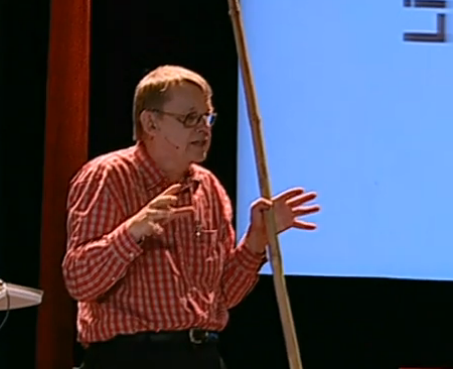In 1949 we saw the emergence of the modern China in a way which surprised the world.
在1949年,新中國(guó)的誕生使全世界都為之驚奇。
And what happened? What happens in the after independence? You can see that the health started to improve.
之后發(fā)生了什么?在獨(dú)立之后發(fā)生了什么?正如你所見,國(guó)民的健康有所進(jìn)步。
Children started to go to school. Health services were provided. This is the Great Leap Forward, when China fell down.
兒童們有學(xué)上。醫(yī)療設(shè)施也逐漸出現(xiàn)。現(xiàn)正是大躍進(jìn)時(shí)期,中國(guó)摔了一大跤。
It was central planning by Mao Tse Tung. China recovered. Then they said, "Nevermore, stupid central planning."
這是由毛澤東統(tǒng)一計(jì)劃的。中國(guó)恢復(fù)元?dú)夂螅麄儎t說:“前事不忘,后事之師。”
But they went up here, and India was trying to follow. And they were catching up indeed.
中國(guó)又日趨上升,印度則是吊車尾。他們都正迎頭趕上。
And both countries had the better health, but still a very low economy.
兩國(guó)的國(guó)民健康大大改善,然后經(jīng)濟(jì)水平仍有待提高。
And we came to 1978, and Mao Tse Tung died, and a new guy turned up from the left.
現(xiàn)在來到1978年,毛澤東已去世,新一代領(lǐng)導(dǎo)出現(xiàn)。
And it was Deng Xiaoping coming out here. And he said, "Doesn't matter if a cat is white or black, as long as it catches mice."
而鄧小平正冉冉上升。他說:“不管黑貓白貓,抓到老鼠就是好貓。”
Because catching mice is what the two cats wanted to do. And you can see the two cats being here, China and India, wanting to catch the mices over there, you know.
因?yàn)檫@正是這兩只大貓想做的。正如你們所知,中印兩只大貓是想要抓住那邊的老鼠。

And they decided to go not only for health and education, but also starting to grow their economy.
因此他們決定不僅要發(fā)展教育和公共衛(wèi)生,也要開始發(fā)展經(jīng)濟(jì)。
And the market reformer was successful there. In '92 India follows with a market reform.
改革開放是成功的。在1992年印度也開始了經(jīng)濟(jì)改革。
And they go quite closely together, and you can see that the similarity with India and China, in many ways, are greater than the differences with them.
他們走的很近,而且兩國(guó)頗多相似之處,而且差異不多。
And here they march on. And will they catch up?
他們齊頭并進(jìn)。可是能迎頭趕上么?
This is the big question today. There they are today.
這是現(xiàn)今世界的一個(gè)大問題。今天,他們處在哪里。
Now what does it mean that the -- the averages there -- this is the average of China.
這說明了—— 他們的平均水平,這是中國(guó)的平均水平。
If I would split China, look here, Shanghai has already catched up. Shanghai is already there.
假如將中國(guó)分開來看,看,上海已經(jīng)趕上了。上海已經(jīng)在上面哪里。
And it's healthier than the United States. But on the other hand, Guizhou, one of the poorest inland provinces of China, is there.
而且市民的平均壽命比美國(guó)還長(zhǎng)。然而,貴州,中國(guó)最窮的一個(gè)內(nèi)陸省,在那里。
And if I split Guizhou into urban and rural, the rural part of Guizhou goes down there. You see this enormous inequity in China, in the midst of fast economic growth.
假如我將貴州分成城市和鄉(xiāng)下兩部分,貴州鄉(xiāng)下仍繼續(xù)下滑。在中國(guó)的迅速經(jīng)濟(jì)發(fā)展下,隱藏著極大的問題。



